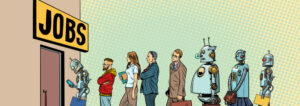Overcoming common faults in the path to digitisation
- 5 Min Read
HR thought leader and author Robin Speculand outlines the key considerations leaders should take when implementing a digital strategy
- Author: Robin Speculand
- Date published: Nov 25, 2021
- Categories

In this new piece, HR thought leader and author Robin Speculand discusses some of the problems that organisations can face as they implement a digitisation strategy, including recognising the scale of the challenge, tackling cultural inertia, and reskilling employees for tomorrow’s world of work.
To illustrate his insights, Speculand draws from his experience of working with Singapore’s DBS Bank, which employs over 25,000 staff members.
As leaders have come to discover, implementing digitisation totally different to executing previous strategies. It’s not just about transformation; it’s about rapidly recognising which technologies are more applicable for customers and for the organisation, and then integrating them as the organisation is learning.
According to research, the success rate for digital transformation is down to one third succeeding, two thirds failing. As such, I want to focus on how a traditional organisation can transform to being digitally driven.
Defining the key challenges
There are three key reasons why digital transformation fails. One is because of the culture of the organisation; shifting from a traditional to a digitally driven organisation, where speed is more important than size, and the need to reduce or eliminate bureaucracy. As the organisation transforms, there’s tremendous pressure on people.
The second one is the mindset of the leaders. You cannot lead a digital company the way you lead a traditional company of the past. For example, in a traditional organisation, many leaders used to walk into a meeting and tell people what to do. However, in a digitally driven organisation, the initiatives are from the ground up; not just hackathons, but design thinking, customer journeys, data analytics, pain point analysis, and you go to the meeting to find out what’s happening.
The role is more as a guide, a mentor and a coach, rather than telling people what to do. Leaders in the past might have been the most knowledgeable people in the room, but today that may not be the case.
The third potential fault is underestimating the whole challenge; it’s not just about tweaking a few of operations, putting in some chatbots or robotic process. It’s about a whole business model transformation, not about applying digital lipstick.
To illustrate the challenges, I’ll use an example of a business I’ve worked with to create implement effective digitisation, DBS Bank. In 2015, at a leadership meeting, they asked a very smart question: what is the biggest roadblock to our digital transformation? This was 12 months into their journey of digital change.
They were having excessive meetings that went on too long, that weren’t effective, that didn’t start on time and lacked an agenda.
Innovating how teams collaborate
Many people can relate to ineffective meetings, especially today, with statistics showing that professionals are doing more meetings per week than they did with video before the pandemic. How did DBS overcome this? They introduced something called Mojo. ‘Mo’ stands for ‘meeting observer’, ‘jo’ stands for ‘joyful observer’.
The organisation put in the governance around the meetings, so the meeting organiser is responsible for ensuring it starts on time, has an agenda, includes everyone in the discussion and runs the meeting efficiently. At the end, the joyful observer then gives them feedback on their performance. If the meeting organiser gets too much negative feedback over a month, they’re banned from organising meetings.
They are now using AI to give digital nudges based on the feedback every month from HR, telling leaders how to improve their performance. The module was a massive success in eliminating wasted time on inefficient meetings, and today it’s thoroughly digitised initially. Previously there were banners and posters in the meeting rooms, but today everything’s presented via mobile phone, like the ability to download meetings through an app devised and launched by the company.
AI and automation as organisational drivers
Looking ahead, AI and data are going to become the engine for the organisation; people will start to move out to the periphery. This scares a lot of professionals and the most common question I hear is, ‘am I going to lose my job?’ The short answer is yes, if you don’t make yourself relevant, because AI is going to drive the operations.
It’s going to be the heart of the business, and the better the data, the better the decisions. For instance, organisations will be able to analyse where there are lots of people doing similar work, and that will become obsolete. The value add is learning the new skills: analysing data, SQL, Python, and machine learning. There’s a massive transformation happening from the people perspective and the challenge is to keep ourselves relevant as businesses rapidly evolve.
One of the events the bank runs frequently is Hack2Hire, which is a massive global competition to capture the best minds around technology. The way it’s run is that the bank sends out some code with a problem; if a professional can to solve it, they’re invited to a hack event. Potential employees are brought together for two days and during that time, they’re given a problem to solve. The solution is not as important as how the people collaborate with each other and how they think.
At the end of the two days, successful entrants can be hired on the spot. It’s an effective way to hire, with particularly good results in India; the bank had more people applying for them than they did for some of the big tech companies.
Additionally, a few years ago, the bank recognised that jobs were going to disappear over time; they identified 1200 jobs out of 27,000 employees, at the time, that were going to vanish. So they lay that and they invested £10 million in retraining the employees in the new skills that were required for tomorrow. There’s been a real success in bringing their employees along with them on the journey.









